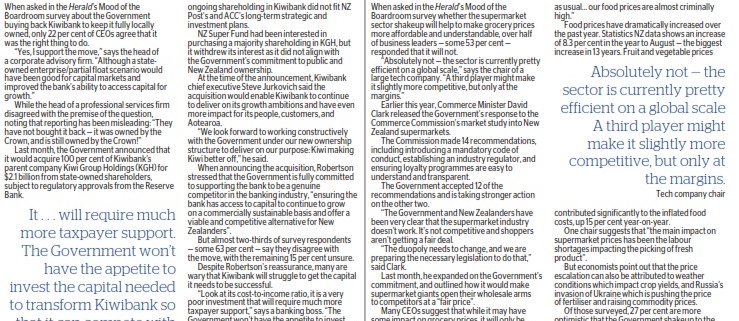Mood of the Boardroom: View on government moves in banking and supermarkets
When asked in the Herald’s Mood of the Boardroom survey about the Government buying back Kiwibank to keep it fully locally owned, only 22 per cent of CEOs agree that it was the right thing to do.
“Yes, I support the move,” says the head of a corporate advisory firm. “Although a state-owned enterprise/partial float scenario would have been good for capital markets and improved the bank’s ability to access capital for growth.”
While the head of a professional services firm disagreed with the premise of the question, noting that reporting has been misleading: “They have not bought it back – it was owned by the Crown, and is still owned by the Crown!”
Last month, the Government announced that it would acquire 100 per cent of Kiwibank’s parent company Kiwi Group Holdings (KGH) for $2.1 billion from state-owned shareholders, subject to regulatory approvals from the Reserve Bank.
KGH is 53 per cent owned by New Zealand Post, 25 per cent by the New Zealand Superannuation Fund, and 22 per cent by the Accident Compensation Corporation.
Finance Minister Grant Robertson said that an ongoing shareholding in Kiwibank did not fit NZ Post’s and ACC’s long-term strategic and investment plans.
NZ Super Fund had been interested in purchasing a majority shareholding in KGH, but it withdrew its interest as it did not align with the Government’s commitment to public and New Zealand ownership.
At the time of the announcement, Kiwibank chief executive Steve Jurkovich said the acquisition would enable Kiwibank to continue to deliver on its growth ambitions and have even more impact for its people, customers, and Aotearoa.
“We look forward to working constructively with the Government under our new ownership structure to deliver on our purpose: Kiwi making Kiwi better off,” he said.
When announcing the acquisition, Robertson stressed that the Government is fully committed to supporting the bank to be a genuine competitor in the banking industry, “ensuring the bank has access to capital to continue to grow on a commercially sustainable basis and offer a viable and competitive alternative for New Zealanders”.
But almost two-thirds of survey respondents – some 63 per cent – say they disagree with the move, with the remaining 15 per cent unsure.
Despite Robertson’s reassurance, many are wary that Kiwibank will struggle to get the capital it needs to be successful.
“Look at its cost-to-income ratio, it is a very poor investment that will require much more taxpayer support,” says a banking boss. “The Government won’t have the appetite to invest the capital needed to transform Kiwibank so that it can compete with the Aussie banks.”
From a tech chair: “The mixed ownership model has worked so well. Floating 49 per cent of Kiwibank and applying the discipline of the investment community while giving the bank increased capital would have been awesome.”
“The Government is paranoid about foreign ownership… or thinks that the public is,” says a chair in the banking sector.



